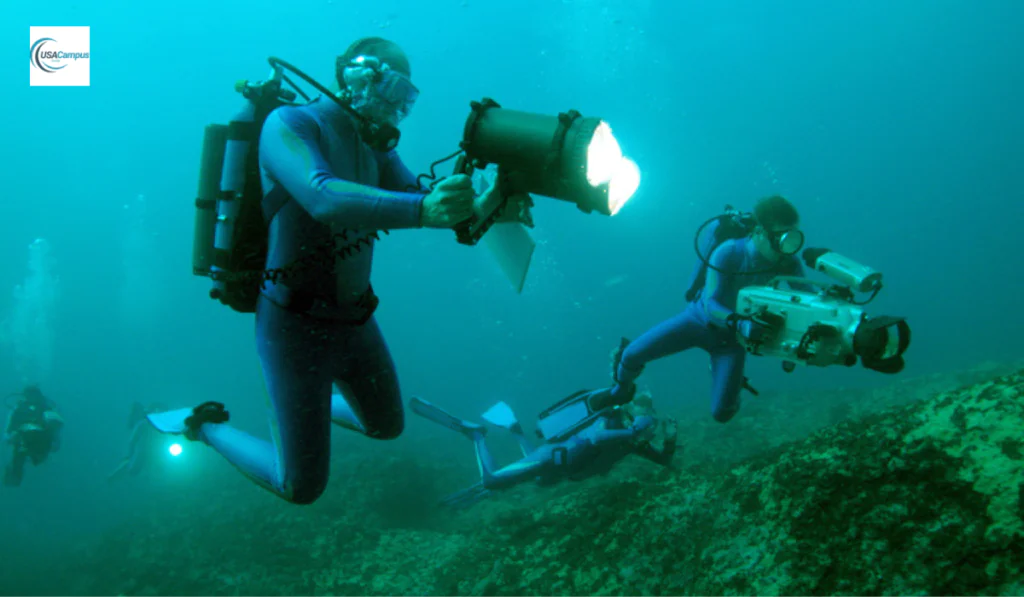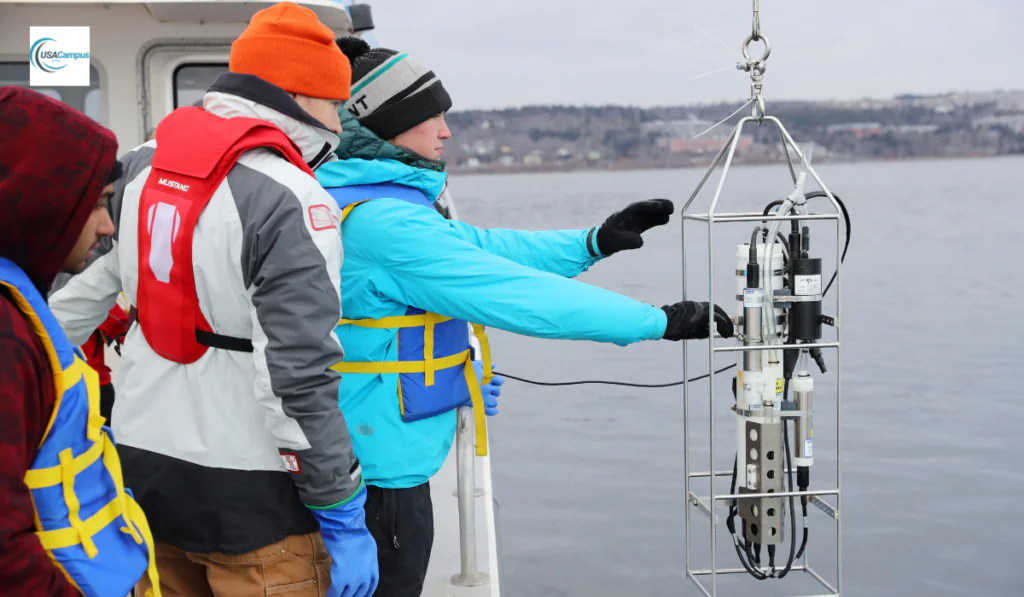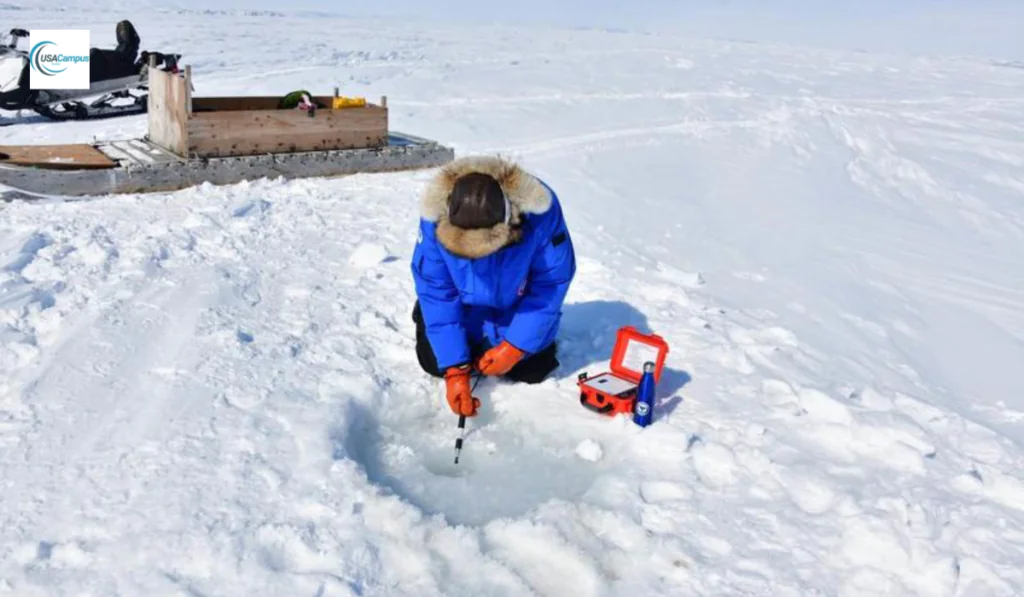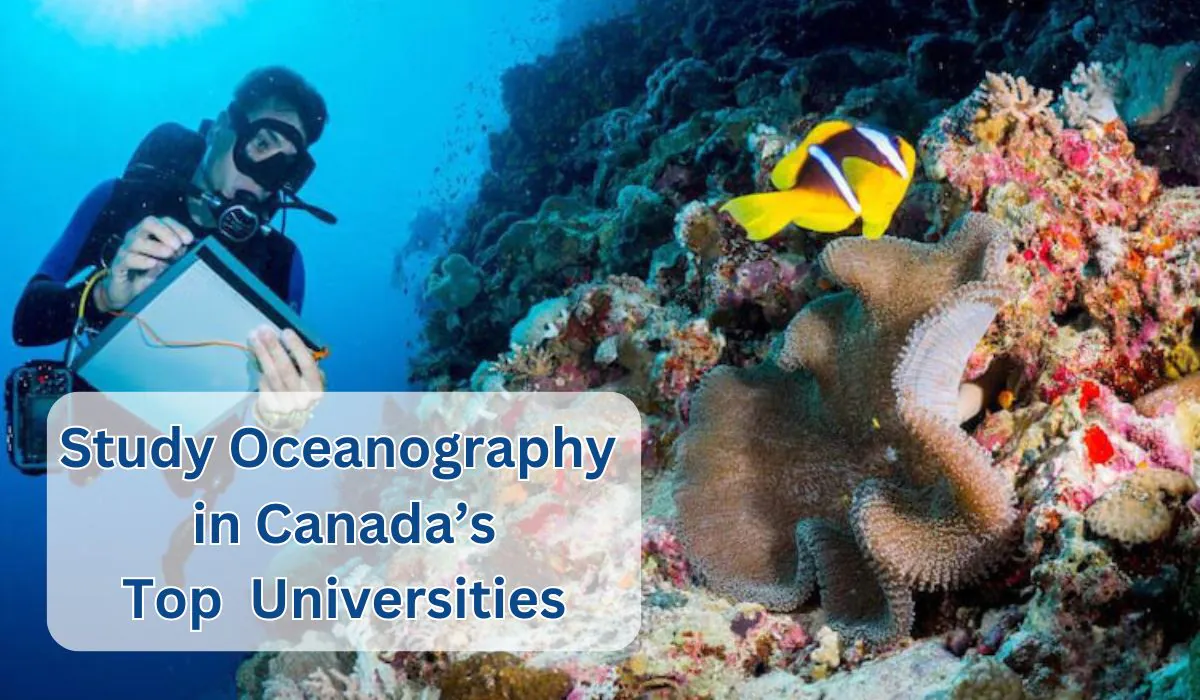Long coastline and lots of marine habitant, make Canada a great country to study Oceanography. Many universities across Canada have their different different specialize course on oceanography. Right from study of oceanography waves and current physics to marine geology, ecology, and climate change.
These universities address multiple issues pertaining to local geography, coastal resilience, sustainable fisheries, marine pollution, and more. The Canadian Meteorological and Oceanographic Society advances ocean and atmospheric sciences.
Top Oceanography Universities in Canada
- University of British Columbia (UBC) – Vancouver, BC
- Dalhousie University in Halifax, Nova Scotia
- The School of Earth and Ocean Sciences at the University of Victoria.
- McGill University – Montreal, QC
- Memorial University of Newfoundland – St. John’s, NL
University of British Columbia (UBC) – Vancouver, BC
UBC in Vancouver is one of the top universities for oceanography students in Canada. The graduates are ready for careers in environmental organizations, education, government, industry, or graduate school.
Key features of UBC’s oceanography program :
The program’s strengths are its interdisciplinary nature, top faculty instruction and collaboration with government researchers, ability to specialize in oceanography subfields, preparation for graduate studies through the Honors option, and access to advanced facilities for a wide range of oceanographic research.

Admission Procedure and Eligibility Criteria for Oceanography
- A four-year Bachelor’s degree with a minimum B+ average (76% at UBC) in 300 and 400 level courses.
- September admission applications are due January 15.
- An online application form, application fee, three reference letters, official transcripts from all post-secondary institutions, and proof of English proficiency are required.
- Application must include a preferred Oceanography faculty research supervisor.
- The TOEFL (minimum score 100) or IELTS (minimum overall band score of 7.0) is required for international applicants from universities outside Canada where English is not the primary language.
Course Structure
The University of British Columbia offers a BSc in Oceanography major in Biology, Chemistry, Physics, or Microbiology. Physical, biological, and chemical oceanography are taught together. Faculty from UBC’s science departments teach.
UBC offers MSc and PhD oceanography programs. These research-intensive programs let students study fundamental and applied oceanography problems with faculty.
How to become Air Traffic Controller in Canada? | 5 Career Prospects
Air Traffic Controller in canada
Fees Structure
Domestic students pay $7,847 CAD , not including student fees.
International students $40,766 CAD for 2024/25 tuition, not including student fees.
Dalhousie College
Halifax’s Dalhousie University’s Department of Oceanography is Canada’s top oceanographic research and education institution. The program studies biological, chemical, geological, and physical oceanography with an interdisciplinary approach.
Key features of Oceanography at Dalhousie College
- Modern research facilities like the Aquatron laboratory, which has a large running seawater system, high-pressure facilities for simulating deep-sea conditions, and federal oceanographic ships support seagoing capabilities.
- Field courses, research cruises, and alliances with leading experts give students hands-on learning.
- Climate change and marine conservation research are departmental contributions.
Admission Procedure and Eligibility Criteria
Oceanography admissions at Dalhousie University in Halifax, Nova Scotia vary by level of study.
- General Faculty of Science admission requirements apply to undergraduate programs.
- The Faculty of Graduate Studies’ general admission requirements apply to masters in oceanography and PhD candidates.
- A relevant undergraduate degree with a minimum 3.0 (B average) GPA in the last 60 credit hours is usually required.
- PhD candidates require a thesis-based oceanography masters degree.
- The TOEFL or PTE Academic is required for international applicants to prove their English proficiency.
Course Structure
Dalhousie University in Halifax, Nova Scotia offers MSc and PhD programs in oceanography. MSc programs take 2 years, while PhD programs take 4-5 years. Both require coursework and thesis research. The department offers seawater systems, high-pressure chambers, and oceanographic vessels for research. Students can do fieldwork and go on research cruises.

Fees Structure
International students pay $10,072 CAD for the MSc and $9,316 CAD for the PhD in 2024–2025. Students pay reduced “continuing fees” of $950 per term plus ancillary fees after the first year.
The School of Earth and Ocean Sciences at the University of Victoria.
Victoria University’s School of Earth and Ocean Sciences offers a comprehensive oceanography class with hands-on learning. This program prepares students for careers in oceanography and related fields by teaching them how to address global climate change, marine pollution, and ocean resource management.
Key features of Victoria University’s School of Earth and Ocean Sciences:
- Integration of geology, geophysics, oceanography, atmospheric, and climate sciences.
- Field trips, schools, and cruises offer extensive fieldwork.
- Access to top research facilities like the Canadian Centre for Climate Modelling and Analysis, Institute of Ocean Sciences, and Geological Survey of Canada (Pacific).
- Opportunities for undergraduate research and collaboration with nearby research faculty and adjuncts.
- Unique location on Vancouver Island provides easy access to diverse marine environments for research.
Admission Procedure and Eligibility Criteria
- Prospective students must find and contact a faculty supervisor whose research interests them before applying.
- A bachelor’s degree in Earth and Ocean Sciences or an equivalent science is essential.
- The application can be sent anytime, with program entry in September, January or May.
- An exceptional academic background with a 90s admission average is required for selective admission.
- For International students TOEFL (90+) or IELTS (6+) scores are necessary to understand their command on English. MSc and PhD options are available, with the MSc taking 2 years to complete.
Course Structure
A Minor in Ocean Sciences and combined majors in Chemistry, Ocean Sciences, Physics, and Ocean-Atmosphere Sciences are available at the University of Victoria School of Earth and Ocean Sciences. EOS 110 (Oceans and Atmosphere) and advanced biological, chemical, geological, and physical oceanography courses (EOS 311-314) make up the core curriculum.
Fees Structure
- The graduate Earth and Ocean Sciences program costs $2,746 CAD per semester for domestic students in 2024.
- Tuition is higher for international students.
- Student society fees, health insurance, and living expenses may be extra.
- Eligible students can obtain scholarships and financial aid from the university.
McGill University – Montreal, QC
The Department of Atmospheric and Oceanic Sciences at McGill University in Montreal, Quebec offers an intesive oceanography program. This is one of few programs in Canada that combines atmospheric and oceanic sciences.

Key features of McGill University – Montreal, QC
- The Master’s and Ph.D. programs enables students to persue advanced research in physical oceanography, climate dynamics, and atmospheric chemistry.
- The department’s close ties to Environment & Climate Change Canada’s Dorval, Quebec numerical weather prediction centre enhance student research and career opportunities.
- The program prepares graduates for careers in academia, government research labs, or industry, with many working for Environment & Climate Change Canada.
Admission Procedure and Eligibility Criteria
- The M.Sc. and Ph.D. programs in Atmospheric and Oceanic Sciences at McGill University require a high second-class standing (3.5 CGPA) or higher.
- A bachelor’s degree in meteorology, physical oceanography, physics, mathematics, engineering, or related fields is required.
- International students whose first language is not English must score 86 on the TOEFL iBT or 6.5 on the IELTS Academic.
- For the Fall term, international students must apply by January 15 and Canadian/permanent residents by February 28.
- Online applications require transcripts, recommendation letters, and a statement of purpose.
Course Structure
McGill University’s M.Sc. in Atmospheric and Oceanic Sciences program covers meteorology, atmospheric science, oceanic science, and related fields. The program demands 45 credits, including 24 thesis credits and 21 complementary courses. Core courses include atmospheric dynamics, waves and stability, cloud physics, and oceanography.
Fees Structure
- International students pay about CA$18,660 per year in total CA$27,990 for the 18-month program.
- Permanent residents pay less tuition. CA$125 is the application fee.
- Graduate students receive stipends, fellowships, and teaching assistant ships from the department.
Memorial University of Newfoundland – St. John’s, NL
An extensive oceanography programs are offered by the Departments of Ocean Sciences and Physics and Physical Oceanography at Memorial University of Newfoundland in St. John’s, NL. Memorial’s Atlantic coast location gives students unparalleled access to the marine environment for field studies and research.
Key features of Memorial University of Newfoundland – St. John’s, NL
- Proximity to one of best research facilities like Logy Bay Ocean Sciences Centre and Bonne Bay Marine Station.
- MSc and PhD ocean sciences and physical oceanography programs
- Oceanography, Marine Biology, and Sustainable Aquaculture and Fisheries Ecology minors are available to undergraduates.
- Unique location for North Atlantic cold-water and deep-sea environments
Admission Procedure and Eligibility Criteria
- Applicants must typically complete 30 credit hours with a minimum of 24 science courses and a 65% average.
- Biology 1001 and 1002, Chemistry 1050 and 1051 (or equivalent), Earth Sciences 1000, Mathematics 1000, Ocean Sciences 1000 (with a minimum grade of 65%), Physics 1020, and 6 credit hours in Critical Reading and Writing are required.
- Prospective students should select bachelor of science on their undergraduate application to the Faculty of Science.
- To enter Memorial University directly from high school, you must meet general admission requirements, including math and lab science courses.
- Applications are due March 1, October 1, and February 1 for fall, winter, and spring admission.
Course Structure
Memorial University of Newfoundland-St. John’s offers undergraduate and graduate ocean sciences and physical oceanography degrees. The undergraduate Ocean Sciences major or honors includes oceanography, biology, chemistry, and physics courses. Graduate programs include MSc and PhD in Ocean Sciences or Physical Oceanography.

Fees Structure
- Canadian master’s and PhD tuition is $3,939 and $3,552, respectively.
- Master’s and PhD programs cost international students $6,654 and $5,996, respectively.
- Graduate students in research-intensive programs receive competitive funding from the university.
Considerations while choosing oceanography program :
- Program Level: Choose whether you want to study at the undergraduate or graduate level.
- Look for universities with strong research programs and facilities in the area you’re interested in.
- Think about how close the university is to oceans or other large bodies of water that can be used for hands-on learning.
- Find out about the faculty members’ areas of expertise to make sure they match your own.
- Choose the program that fits with the career goals, whether it’s in environmental management, industry, or research.
Oceanography Occupations for New Grads
Getting a degree in oceanography from a university in Canada can open up a lot of job doors. Graduates may be able to get jobs in:
- Schools and research centers – Government departments (like Fisheries and Oceans Canada)
- Environmental firms that do work
- Taking care of marine resources
- Studying climate change and making policies about it
- Offshore energy companies – Marine conservation groups
- National oceanography centre jobs
Oceanography Pay
Normally student after their graduation are hired by above mentioned top firms, also they can expect good bonuses and receive several grants for their research. Below is the brief idea of their earning:
- Salary Ranges:
Final Word
Canada has a lot of great places to study oceanography, and its universities are some of the best in the world. They offer comprehensive degrees at undergraduate as well as graduate levels. The University of British Columbia and Dalhousie University are two of the best schools worldwide. They have cutting-edge facilities and research opportunities. But many other universities across the country also have great programs in oceanography and other marine sciences.
As the world’s attention on climate change and protecting the oceans grows, so will the need for skilled oceanographers. If you choose to study oceanography in Canada, you’ll be ready to make a real difference in how we understand and take care of the world’s oceans.
FAQ’s
What is Oceanography?
The scientific study of all facets of the oceans and seas around the world is known as oceanography. The key features of oceanography are as follows:
The physical, chemical, geological, and biological characteristics of the ocean are the subject of the interdisciplinary science of oceanography. Ocean currents, waves, marine ecosystems, seafloor geology, the chemical makeup of seawater, and the connections between the ocean and atmosphere are just a few of the many themes it covers.
What are the 4 branches of oceanography?
Physical Oceanography: Studies the physical properties and dynamics of the ocean, including currents, waves, and tides.
Chemical Oceanography: Examines the chemical composition of seawater and chemical processes in the ocean.
Geological Oceanography: Focuses on the structure and evolution of the ocean floor.
Biological Oceanography: Studies marine organisms and their interactions with the ocean environment.
Why Oceanography is important
To understand weather patterns, marine ecosystems, and climate change which depends on oceanography.
It supports the preservation of marine habitats and the sustainable management of ocean resources.
Policies pertaining to fisheries, marine conservation, and coastal management are informed by oceanographic research.
I am Micheal V, a freelance blog writer. I have expertise in writing blog with interest in Travel, Education, Stock Market. I can help my customers to get Ad sense Approval, You can connect with me for any blog writing service on “usacampusguide@gmail.com“, by mentioning Subject as “Blog Writing Service”
